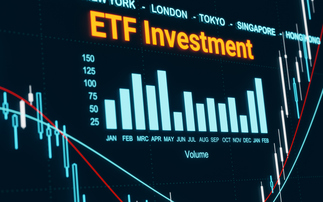INDUSTRY VOICE: The growth in popularity of ETFs has inspired a proliferation of options, providing investors with many different ways to access the core equity and bond markets. How to choose what to invest in? Lyxor ETF discusses why cost is the starting point for many investors.
Keeping a lid on cost is one of the most effective ways of maximising returns. But cutting cost doesn't have to mean cutting corners. Quality is still important. Investors need to know their fund is robust and ready for the long haul. Experience and expertise are just as important here as they are for any other type of fund.
With investors and their interests at the forefront of our minds, we've just launched a new range of 16 ETFs with some of the lowest costs in the European market.* As always, they cleave to the standards set by our quality charter.
More: Lyxor launches 0.04% fee ETFs
Why is reducing costs so important?
Quite simply, the more a fund manager takes out of an investor's assets for themselves in the form of fees, the less goes back to the investor. And even while differences in fees might appear quite small, the longer an investor's time horizon, the bigger their impact on returns because of the way investment returns compound over time. Take the example of two funds; one charging 1%, a not untypical cost of a traditional active fund, and another charging 0.04%, a more aggressive ETF fee. You can see that over 10 years, this difference can have a profound impact on your investment. Obviously we're ignoring performance here to keep things simple, but that is another story.
Find out more about Lyxor's low cost ETF range
An illustration of the impact of fees on a £100 investment
Source: Lyxor International Asset Management. For illustrative purposes only.
The role of MiFID II in promoting cost-cutting
Recent regulatory developments mean there's more scrutiny on cost now than ever before. The MiFID II rules, which came into play across Europe at the beginning of January, require much greater transparency when it comes to the fees investment managers charge and all the related costs of their products. This is shining a spotlight on the overall cost burdens investors are facing, and these new standards mean there's nowhere to hide for asset managers. Such clarity around fees may well lead investors to flock towards lower-cost options such as ETFs.
Another reason is that up until MiFID II, in certain European countries fund managers could pay a rebate - or retrocession - to their funds' distributors in return for selling their products. This is no longer possible, thus removing the incentive for investors to allocate to some of the more expensive options available to them. So in other words, all else being equal, investors are more likely to choose a less expensive option than they were before MiFID II. We'd argue the change in mindset is overdue - ETFs never paid retrocessions in the first place.
Isn't choosing the right exposure more important than fees?
So fees matter, but doesn't choosing which index to follow matter more?
Let's consider the returns of the returns of six different US equity indices this February - a month characterised by several sharp twists and turns as volatility returned to the stock markets. Surely there should have been considerable performance dispersion across this range of benchmarks?
Actually, not as much as you might expect. Despite the benchmarks being constructed according to different approaches and guidelines, they delivered almost identical returns. This can in large part be explained by their market-capitalisation-based weighting methodologies, which means their biggest holdings tend to be very similar to each other's, driving the convergence of their returns.
Performance of various US equity indices in February 2018*
| Index | February 2018 total return (%) |
| S&P 500 TR USD | -3.686 |
| Morningstar US Market Index TR USD | -3.687 |
| Russell 1000 TR USD | -3.671 |
| Russell 3000 TR USD | -3.686 |
| CRSP US Total Market TR USD | -3.722 |
| MSCI USA IMI GR USD | 3.718 |
*Source: Morningstar Indexes, March 2018, ‘Market Beta is a Commodity. Don't overpay.' by Dan Lefkovitz. Data observed between 01/02/18 - 28/02/18. Past performance is not a reliable indicator of future returns.
This isn't just a short term co-incidence, if you look at returns over much longer periods, the story is the same.
Index returns over different time periods*
*Source: Morningstar. Data as at 28/02/2018. Past performance is not a reliable indicator of future returns. **Source: Morningstar. Data period 01/06/1992-28/02/2018, based on monthly returns. Past performance is not a reliable indicator of future results.
Choosing a partner
For all that, index selection does still matter. We take great care in choosing our index partners. High quality data, robust processes and rock solid governance are important factors when building market-cap weighted indices. We prefer to partner with big, trusted brands with a strong track record in indexing. But equally, if we can cut costs to help investors without compromising on quality, we'll do exactly that.
Video: Chanchal Samadder talks about index choice for the Lyxor Core ETFs
Minimise your costs with Lyxor's new range of low-cost Core ETFs
In an environment in which every basis point matters, it's a no-brainer to choose an ETF that only charges very low fees. And that's exactly what we now provide. This week we launched a range of 16 low-cost ETFs providing exposure to core asset classes with fees ranging from just 4 basis points up to 12 basis points - some of the lowest fees in Europe.*
Providing our clients with high-quality ETFs at such low cost might sound simple, but it isn't: we're only able to do so thanks to the experience we've gained over the past 17 years running ETFs and the scale we've achieved in the process. And you can be confident that while we're cutting costs in our new range of core ETFs, we're not cutting corners: each fund meets exactly the same stringent quality standards covering their performance, risk control, liquidity and transparency that have long governed our wider range. They're all replicated physically - the best option for large, liquid exposures like those in our core strategies - and we don't use securities lending, so you know exactly what you're investing in at any given time.
Find out more about the Lyxor Core ETF range
THIS COMMUNICATION IS FOR ELIGIBLE COUNTERPARTIES OR PROFESSIONAL CLIENTS ONLY
*Source: Lyxor International Asset Management, as at 21/03/2018.
This document is for the exclusive use of investors acting on their own account and categorized either as "Eligible Counterparties" or "Professional Clients" within the meaning of Markets in Financial Instruments Directive 2004/39/EC. These products comply with the UCITS Directive (2009/65/EC). Société Générale and Lyxor International Asset Management (LIAM) recommend that investors read carefully the "investment risks" section of the product's documentation (prospectus and KIID). The prospectus and KIID are available free of charge on www.lyxoretf.com, and upon request to [email protected].
The products mentioned are the object of market-making contracts, the purpose of which is to ensure the liquidity of the products on the London Stock Exchange, assuming normal market conditions and normally functioning computer systems. Units of a specific UCITS ETF managed by an asset manager and purchased on the secondary market cannot usually be sold directly back to the asset manager itself. Investors must buy and sell units on a secondary market with the assistance of an intermediary (e.g. a stockbroker) and may incur fees for doing so. In addition, investors may pay more than the current net asset value when buying units and may receive less than the current net asset value when selling them. Updated composition of the product's investment portfolio is available on www.lyxoretf.com. In addition, the indicative net asset value is published on the Reuters and Bloomberg pages of the product, and might also be mentioned on the websites of the stock exchanges where the product is listed.
Prior to investing in the product, investors should seek independent financial, tax, accounting and legal advice. It is each investor's responsibility to ascertain that it is authorised to subscribe, or invest into this product. This document is of a commercial nature and not of a regulatory nature. This material is of a commercial nature and not a regulatory nature. This document does not constitute an offer, or an invitation to make an offer, from Société Générale, Lyxor Asset Management (together with its affiliates, Lyxor AM) or any of their respective subsidiaries to purchase or sell the product referred to herein.
Lyxor International Asset Management (LIAM), société par actions simplifiée having its registered office at Tours Société Générale, 17 cours Valmy, 92800 Puteaux (France), 418 862 215 RCS Nanterre, is authorized and regulated by the Autorité des Marchés Financiers (AMF) under the UCITS Directive (2009/65/EU) and the AIFM Directive (2011/31/EU). LIAM is represented in the UK by Lyxor Asset Management UK LLP, which is authorized and regulated by the Financial Conduct Authority in the UK under Registration Number 435658. Société Générale is a French credit institution (bank) authorised by the Autorité de contrôle prudentiel et de résolution (the French Prudential Control Authority).
Lyxor International Asset Management ("LIAM") or its employees may have or maintain business relationships with companies covered in its research reports. As a result, investors should be aware that LIAM and its employees may have a conflict of interest that could affect the objectivity of this report. Investors should consider this report as only a single factor in making their investment decision. Please see appendix at the end of this report for the analyst(s) certification(s), important disclosures and disclaimers. Alternatively, visit our global research disclosure website www.lyxoretf.com/compliance.













